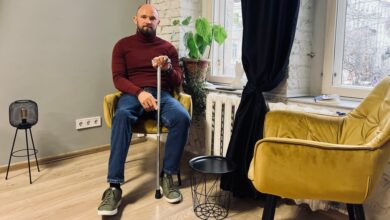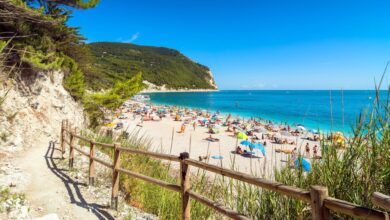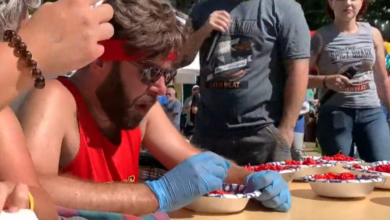Female first responders camp sparks international interest

School is out for the summer, but for select students, their work is just about to begin.
Since 2006, Camp Courage has held its free camp during the first week of July in the Halifax Regional Municipality.
The week-long camp is designed to introduce female and gender diverse youth between the ages of 15-19 to what it’s like to be a first responder. Different days are focused on different careers, like firefighting, police, paramedics and coast guard.
“It’s transformative, without a doubt,” explains the non-profit’s founder and professional firefighter, Andréa Speranza.
Camp Courage expanded to include Alberta in 2021, and New Brunswick in 2022. Despite the growth of the camp, and now, international interest, getting the initial camp started took six years, and multiple attempts.
“I originally had the idea in 2000,” says Speranza. “I presented it to outreach in 2001, and they didn’t think it was a good idea for the fire department. Then in 2003, I thought, they didn’t understand what it was.”
Speranza did a formal PowerPoint. She was turned down again. It was followed by a one hundred page business plan in 2005, but was rejected again.
“So then, I just raised the money with my friends and did it. And now, everybody’s on board.”
 Andréa Speranza (right) is the founder of Camp Courage.
Andréa Speranza (right) is the founder of Camp Courage.
International interest
Now, representatives from British Columbia and Australia are in Halifax observing this year’s camp.
“I just thought it was an amazing initiative,” says Bill Riggs, the chief executive officer for Royal Canadian Marine Search and Rescue.
RCMSAR is a volunteer marine search and rescue organization in British Columbia that includes over 900 volunteers across 31 stations.
Riggs first heard of Camp Courage two years ago from the national office for the Canadian Coast Guard Auxiliary.
“It’s a great opportunity for young women to learn about areas they might not know about,” adds Riggs, speaking from Victoria. “So, for example, they may never have considered the Coast Guard as a lifestyle because they didn’t know anything about them. So, it locks into your brain and becomes something that perhaps you want to pursue later in your life.”
Riggs believes about 20 per cent of RCMSAR’s volunteers identify as female.
“That’s a number that has to go up, and we recognize that,” explains Riggs. “I felt it was important that we go out and actually see it being run, because our hope is that we can get it up and running here on the [west] coast by 2025, which is pretty ambitious.”
Indigenous representation
Also sending a scout from British Columbia is the Coastal Nations Coast Guard Auxiliary, based in Port Coquitlam.
The CCGA conducts marine search rescue in nine Indigenous communities.
“I really do see Camp Courage as a stepping stone to reconciliation,” explains Dawn Wilson, the CEO of CCGA. “Having these young ladies entering positions in the Canadian Coast Guard or RCMP, as well as paramedics or firefighters, will foster trust between these Canadian institutions and the remote Indigenous communities, improving their relationships. But going even further, it allows these women to be employed in their home communities instead of seeking work in the cities, and allows them to raise their children in their culture, which is huge.”
A representative from CCGA will also bring back what they witness at Camp Courage on the east coast, back to the west coast.
“I know she’s going to bring back great ideas and collaborate with our Indigenous communities to improve and adapt Camp Courage to suit our Indigenous young ladies on the west coast.”
Founder Speranza adds she’s also receiving inquires from other provinces, like Prince Edward Island, as well as some states and the Caribbean.
Changing the status quo
Eighteen years after starting the first camp, Speranza says she’s starting to see more female first responders, especially firefighters.
“I’ve had people after the fact saying, ‘wow, you know, the integration of more females has actually improved the fire service,’” explains Speranza. “If there’s a patient having a baby, she might be more comfortable with a female. Or, getting a female first responder into a small car for a vehicle extrication. It can’t be all six foot men who are 300 pounds.”
Graduates are often ‘the firsts’ in their departments.
“In my fire department, we had less than 1 per cent,” adds Speranza. “Now, whether it’s career, career volunteer, or admin, it’s between 11 and 15 per cent.”
 The goal of Camp Courage is to ensure the youth leave with a sense of empowerment and the confidence. (Source: Camp Courage/Facebook)
The goal of Camp Courage is to ensure the youth leave with a sense of empowerment and the confidence. (Source: Camp Courage/Facebook)
According to the 2022-23 HRM Workforce report, 58 out of 511 employees in the International Association of Fire Fighters union identify as female. In an email to CTV News, HRFE deputy chief David Meldrum writes that since 2021, women have represented about 25 per cent of new, career firefighters. The numbers do not reflect volunteer firefighters.
“As we hire new firefighters, we are working hard to increase inclusion of women,” writes Meldrum. “Our goal is to have recruit classes which reflect the communities of HRM.”
Speranza is now working with students she mentored.
“Last year, I had three of my camp graduates graduate from our fire department, and they got rehired, and I actually worked a shift with them, it’s just so amazing,” explains Speranza. “I never was posted with another female firefighter for 20 years.”
According to Speranza, 36 per cent of Camp Courage graduates enter into an emergency services field.
Camper perspective
Rachel Kang, 17, has always had an interest in firefighting.
“My brother is a volunteer firefighter, as well as a police dispatcher,” explains the Island View High School grad. “He gave me a card for Camp Courage and said this would be a great opportunity for you to get a feel of what it’s like to be a first responder.”
She’ll be attending the camp this week, after successfully submitting an application essay on how she can help her community.
 Rachel Kang, 17, will be attending Camp Courage this summer.
Rachel Kang, 17, will be attending Camp Courage this summer.
“I have a really deep passion for helping other people, so I thought I would really suit being a firefighter,” Kang explains. “I just feel like it’s such a great opportunity, especially for young women.”
Meeting young women her own age, with similar interests, is also appealing.
“And having people to talk to there that will help me pursue my dream of being a firefighter.”
Life at camp
The location of the camp changes on the day, depending on the focus.
While physical skills include repelling and climbing a 100 foot ladder, it also empowers campers to excel in everyday life.
“They get to learn mindfulness and resilience, it’s life changing,” explains Speranza. “They have the right mindset when they enter that, yes, you’re going to do hard things, but we are going to help you, and we’re going to adjust things so that you’re comfortable, but there are no limits and there are no ‘I can’t’.”
Students who participate also get a high school credit. Once camp is done, the mentors also help campers get recruited.
Mentor mentality
“It was the best week of my life, for sure,” says firefighter Christie Webb. “After this camp, it was clear to me that firefighting was where I wanted to end up.”
The Hantsport, N.S., native was first introduced to the camp as a 17-year-old in 2013. Webb is now a professional firefighter with Halifax Regional Fire & Emergency at Station 45 in Fall River, N.S. She returned to Camp Courage every year as a mentor, and is now a coordinator and fire instructor for the Camp.
 Christie Webb was introduced to Camp Courage when she was 17. Now, she is a professional firefighter with Halifax Regional Fire & Emergency at Station 45 in Fall River, N.S.
Christie Webb was introduced to Camp Courage when she was 17. Now, she is a professional firefighter with Halifax Regional Fire & Emergency at Station 45 in Fall River, N.S.
“It’s just so rewarding to give back to this camp, because I was once in the camper shoes, and now, I want to inspire and empower young women, like Andréa did for me,” adds Webb.
“Our support doesn’t end at the camp. We’re like a lifelong support network. We consider it a community,” says Speranza. “And many of our graduates come back for a decade or more teaching. They get in the roles and then they come back and they teach. There’s nothing better than that.”
While the camp continues to empower a new generation of first responders and leaders, the future is bright for its creator.
“I want it across the world, and it’s going to be across the world,” finishes Speranza.
For more Nova Scotia news visit our dedicated provincial page.




